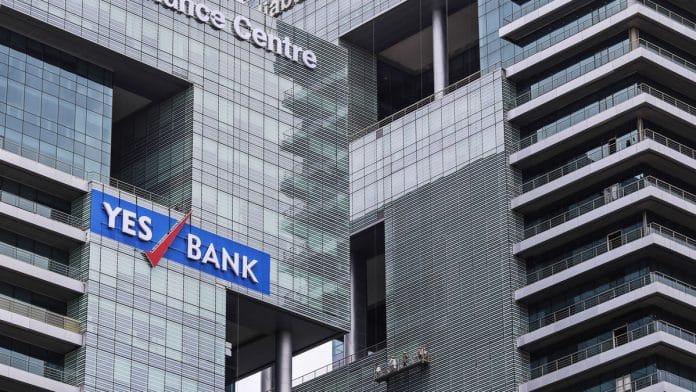New Delhi: A Rashtriya Swayamsevak Sangh (RSS) affiliate has held the Reserve Bank of India (RBI) responsible for the failure and mismanagement of Yes Bank, in a direct contravention of the Narendra Modi government’s position.
Speaking to ThePrint, Swadeshi Jagran Manch (SJM) chief Ashwini Mahajan said the central bank cannot wash its hands off the bank’s failure as it didn’t intervene at the right time.
The remarks came days after the central bank and the Modi government took control of the affairs at Yes Bank as charges of alleged financial irregularities and mismanagement in the bank’s operations surfaced.
According to Mahajan, the RBI should have acted earlier and not behaved as a mute spectator since it has the mechanism to monitor banks’ activities on a daily and weekly basis.
“Why did RBI not detect spike in Yes Bank loan book in the last few years when it was jumping at more than 30 per cent,” asked SJM co-convener Mahajan.
His question echoed former finance minister and Congress leader P. Chidambaram’s criticism of the Modi government, holding it responsible for “mismanagement of financial institutions”.
Finance Minister Nirmala Sitharaman, however, said the RBI acted well in time, issuing governance notices to Yes Bank as far back as 2017.
Also read: How the half-hearted rescue of Yes Bank has turned into a crisis
The promoters’ holding question
Speaking to ThePrint, SJM co-convener Ashwini Mahajan said, “We had cautioned the government in 2018 when RBI governor Urjit Patel was insisting on promoters’ holding to be reduced to zero per cent.”
Mahajan blamed the RBI policy responsible for the management faults of private banks.
“In this sequence, the shareholding of Yes Bank’s promoter Rana Kapoor was forced to be reduced gradually and today the situation is that those who are under the management of Yes Bank do not have much or even any stake in the bank,” said Mahajan.
The SJM chief said those who are running the management of Yes Bank today have “no skin in the game”.
“If the promoters’ shareholding had not been reduced to zero, they would have remained interested in the health of the bank and the bank would not have reached this condition,” he said.
“Therefore, there is scope for the Reserve Bank to reconsider the policy that reduces promoters’ holding to zero. There is a need for the RBI to rethink the regulatory framework for private banks’ ownership,” he added.
On Sunday, the Enforcement Directorate arrested Yes Bank founder Rana Kapoor on money laundering charges. The agency is probing some companies owned by Kapoor’s family that are suspected to have received a Rs 600-crore kickback from Dewan Housing Finance Corporation Ltd (DHFL) in return of loans worth Rs 4,450 crore from Yes Bank.
Once among India’s six largest private banks, Yes Bank reached a crisis after its core loan book holders IL&FS, DHFL and Jet Airways were brought down by severe financial mismanagement. Due to a large exposure to these struggling companies, the bank has been unable to raise funds.
Last week, FM Nirmala Sitharaman announced that the State Bank of India is now going to buy a 49 per cent stake in the crisis-hit bank.
Also read: How Yes Bank plunged into crisis: A timeline
On bank mergers
The Yes Bank episode has proved “that privatisation of bank is not the solution” to India’s banking crisis, SJM chief Ashwani Mahajan said.
“This experience shows that some former RBI governors’ demand of privatisation of public bank is against national interest of the country,” he said.
Saji Narayanan, chief of another RSS affiliate, the Bharatiya Mazdoor Sangh, said the Yes Bank fiasco was waiting to happen.
“We had cautioned the government in the past against giving licenses to private corporate to run banks. We had cautioned the government against the dangers of privatisation of bank but the government didn’t heed to us,” he said.
Narayanan said the BMS has alarmed the government against the merger of big banks and creation of big corporations but it doesn’t seem ready to learn lessons from other countries. He added that the government is focussing on solving the present crisis but not looking at the big picture.
“We survived in 2008 in Lehman Bank crisis due to our stable and decentralised public sector banking sector in India,” he said.
“Eight per cent of our small scale industry is dependent on small banks. After merger, lending growth will be hampered because large banks will focus on large lending. This will dampen growth of small scale industry and loss of jobs,” added Narayanan.
The SJM chief added that last week’s Union Cabinet decision to merge 10 public sector banks should be reviewed. “The RBI should come out with fact sheet that what benefit country will get from this merger.”
Also read: How a reform on Modi govt agenda can protect your deposits & keep banks from failing







Nonsense……. everybody has a voice, if this Manch has voice, it is it’s own.